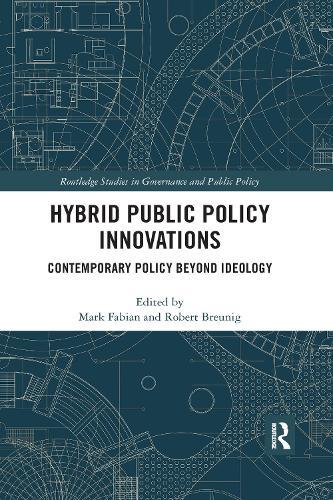Full Product Details
Author: Mark Fabian ,
Robert Breunig
Publisher: Taylor & Francis Ltd
Imprint: Routledge
Weight: 0.430kg
ISBN: 9780367592066
ISBN 10: 0367592061
Pages: 312
Publication Date: 14 August 2020
Audience:
College/higher education
,
Tertiary & Higher Education
Format: Paperback
Publisher's Status: Active
Availability: In Print

This item will be ordered in for you from one of our suppliers. Upon receipt, we will promptly dispatch it out to you. For in store availability, please contact us.
Reviews
'A timely antidote to the siren song of populism, Hybrid Public Policy Innovations reminds us of the value of evidence-based policy. Grounded in theory, and illustrated with examples from schools to water, jobs to pensions, the highly qualified contributors to this book make a powerful case for solutions grounded in facts, reason and rigorous analysis.' - Andrew Leigh, Member of the Australian Parliament and author of Choosing Openness 'In a world where evidence and expertise are under sustained attack from well-resourced think tanks, major political parties and a large section of the media, it is important to restate the benefits of an evidence-based approach to public policy, leading to an approach that works with the strengths of the market, government intervention and civil society. This book is both a defence of evidence-based policy and a guide to recent innovations.' - John Quiggin, Australian Laureate Fellow in Economics, University of Queensland 'This book is a collection of independent, but coherently connected, chapters on public policy issues with a focus on Australia. The authors are from diverse backgrounds - from academics to politicians - and possess different expertise.They cover important behavioural, institutional and regulatory issues that can modify the effectiveness of policies and offer some solutions and priorities to address those issues. This book is not a textbook, but it has the potential to be so for policy-makers. Those who seriously think about evidence-based policy-making, regardless of their background, will also find the book useful. Courses related to quantitative policy evaluation may also employ the book as a text, supplemented by more quantitative materials on policy evaluation. I am looking forward to using it for my lectures on impact evaluation.' - Syed Hasan, School of Economics an
'A timely antidote to the siren song of populism, Hybrid Public Policy Innovations reminds us of the value of evidence-based policy. Grounded in theory, and illustrated with examples from schools to water, jobs to pensions, the highly qualified contributors to this book make a powerful case for solutions grounded in facts, reason and rigorous analysis.' - Andrew Leigh, Member of the Australian Parliament and author of Choosing Openness 'In a world where evidence and expertise are under sustained attack from well-resourced think tanks, major political parties and a large section of the media, it is important to restate the benefits of an evidence-based approach to public policy, leading to an approach that works with the strengths of the market, government intervention and civil society. This book is both a defence of evidence-based policy and a guide to recent innovations.' - John Quiggin, Australian Laureate Fellow in Economics, University of Queensland 'This book is a collection of independent, but coherently connected, chapters on public policy issues with a focus on Australia. The authors are from diverse backgrounds - from academics to politicians - and possess different expertise.They cover important behavioural, institutional and regulatory issues that can modify the effectiveness of policies and offer some solutions and priorities to address those issues. This book is not a textbook, but it has the potential to be so for policy-makers. Those who seriously think about evidence-based policy-making, regardless of their background, will also find the book useful. Courses related to quantitative policy evaluation may also employ the book as a text, supplemented by more quantitative materials on policy evaluation. I am looking forward to using it for my lectures on impact evaluation.' - Syed Hasan, School of Economics and Finance, Massey University, New Zealand, Regional Studies (2020)
Author Information
Mark Fabian is a PhD Candidate in Economics at the Crawford School of Public Policy where he teaches economics for public policy and development economics. He conducts research into welfare and sustainable development at the intersection of philosophy and economics. His most recent published work was on long work hours in Australia, and his current projects concern how we can better integrate philosophical and psychological knowledge about happiness and wellbeing into public policy. Robert Breunig is former Director of the Crawford School of Public Policy where he teaches empirical public policy and director of the Tax and Transfer Policy Institute. He is a frequent collaborator with the Australian government. He conducts research in three main areas: applied labour economics, policy impact evaluation and behavioural responses to the tax system. In recent work, he has studied the inter-generational transmission of dependence on government assistance; he has examined the relationship between women’s labour supply and childcare policy and studied optimal childcare subsidy policies; he has examined the complex relationship between outsourcing and innovation; and he has estimated taxpayer responsiveness in the Australian tax system.




